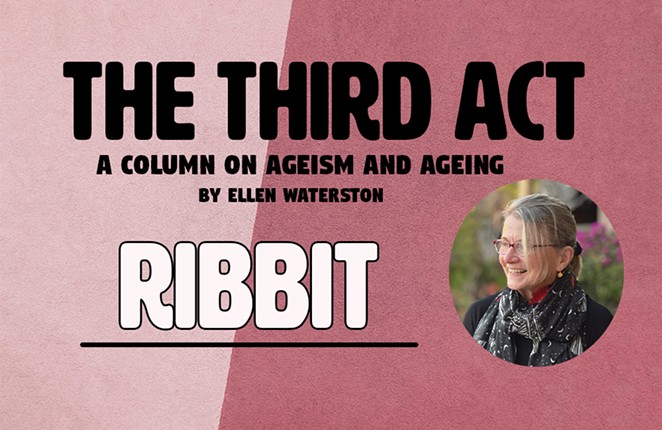Go ahead, call me a batrachopile, a ranidaphile. You can have your crocus, your yellow blaze of forsythia and daffodil, or the exuberant conk-la-ree song of the red winged blackbird as it heralds its return north. For me the real sign of spring is the sound of the peeper, the tiny, paper clip-sized tree frog that nests all winter under leaves and underbrush next to ponds, wetlands or manmade water features. Not only are these mighty-mites able to live on land or in water, but during the winter their tiny livers flush their bloodstream with what is essentially anti-freeze, a cyroprotectant glucose, allowing them to slow their hearts to a state of dormancy until temps get back to a balmy 40 degrees. It's then the hooray begins. They hop out of hiding, a balloon of sound fills up their froggy chest and the nighttime hullabaloo gets underway. Though its formal name is Pseudacris Crucifer, another name for this cheery harbinger of spring is, no surprise, Chorus frog.
April is National Frog Month, a tribute to frogs' reemergence in spring. Okay, a bit niche, but the peepers' din does serve to put us on notice that we have another spring to celebrate, new beginnings, new adventures. In the world of spirit animals, frogs represent transition — the successful progression from one stage of life to the next, the capacity to move on from any situation. They come by this reputation honestly, their ancestors dating back 250 million years.
Most phases or transition periods humans experience as sequential, taking place in the progressive tense...newborn-ing, toddler—ing, adolescenting, adult-ing. These are all future-forward stage names that imply certain expectations and structures. Young adult? Find work and relationship. Mid-life? Skip the crisis and, instead, focus on growing a family, a business, a community. Go! Go!
Then there's retirement. It's what happens after mid-life, post-middle-age, before decrepitide. It's when we're supposed to...pursue leisure until the end of life? It's a bit amorphous as a phase, lacking in definitive cultural or social expectations. And it's a model that doesn't work for the vast majority of 65-year-olds who either prefer a different approach or can't afford to take off the work mantle or both. In both cases they're the richer for it, if you're to believe reports on the benefits of staying engaged and on purpose. The words "retire," "retiree" and "retirement" derive from the French retirer, meaning to withdraw, go away. In Europe the common designation is pensioner, conjuring a social dependent who has ceased working, all take and no give. Words shape our reality. Retirement suggests backward motion. Believe it and you will see it. As long as we keep using the word retirement, or even clever wordplays such as "the new retirement," or "refiring," or, a bit more positive, "starting older," a trace of withdrawal, of endings, is still in the air. Given our longer life expectancy, we need a new word for the 20-plus years of activity after 65, for mapping this uncharted transition territory. Go, Magellans! A word that often comes up when asked to describe the experience of the ageing process is diminishment. The time left is shrinking. We want to take full advantage of it, but all systems are not as go as they used to be, something we now must actively factor in when planning a day, a hike, a vacation or climbing the stairs. If only we could stop the clock. Some think they can. Modern-day Magellans of a different ilk are taking a page from the hibernating peepers, placing their dead human bodies in cypropreservation (liquid nitrogen) or in Biostasis, as it's called. Futuristic scientists speculate they can reverse death by preserving the brain and 3-D printing a new body once that technology gets up to speed. "Once that technology is up to speed" is the operative. Meanwhile, hundreds of bodies lie in frigid waiting around the world.
But without such draconian measures, and, instead, celebrated for the good, bad and ugly of what it is, this phase of life is as rich, complex and dynamic as any before it. It's definitely not easy or peasy. It requires we cope and adapt in ways we never imagined, but when has that not been true? Rather than retiring into the background, maybe the structure and expectation of this phase is to take the center of this age's stage with all the vitality, creativity and contentment we can muster. The Spanish got it right. Their word for retirement is jubilación. If you say jubilation fast 10 times it almost starts to sound like ribbit! Well, kinda, but you take my meaning.
—Poet and author Ellen Waterston is a woman of a certain age who resides in Bend. "The Third Act" is a series of columns on ageing and ageism.

























